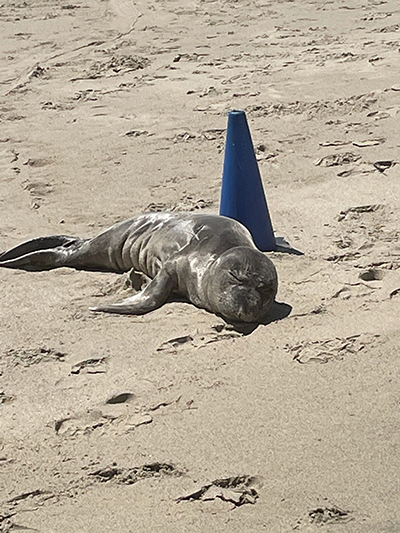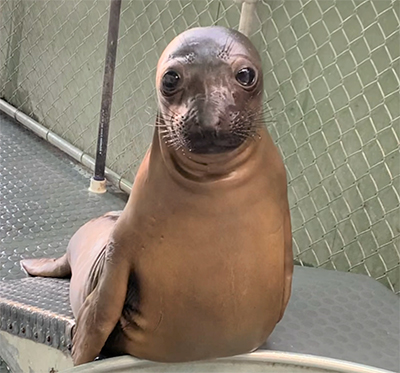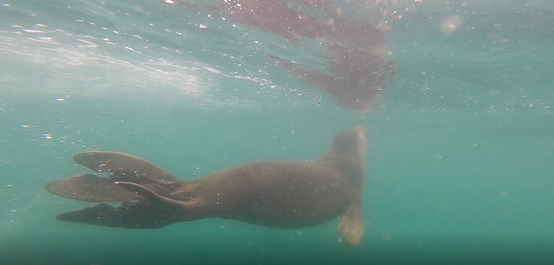A Unique Release for a Unique Seal
By KC Scofield, Stranding Coordinator

Northern Elephant Seal “Blue” waiting to be rescued
Photo by Joan Zoloth, finder
On March 14th, we rescued an underweight Northern Elephant Seal pup at the La Costa Beach Club in Malibu. Once admitted this pup was marked with a blue non-toxic grease marker used identify individuals while in care, so we began to call him “Blue.” These marks are helpful when telling the seals apart, making it easier to accurately track diets, weight gain, medications, and general progress.

Blue standing tall before going for a swim
Photo by Tara Wilson
We rescued Blue when he was around two or three months old. He was underweight at 86.6 pounds close to what his birth weight would have been. When leaving the rookery, or breeding area, and living on their own, Elephant Seal pups must teach themselves how to swim and fish. This can lead to trouble learning to recognize and swallow fish, a challenge Blue faced during his stay. His learning process was slower than usual, and he had difficulty digesting fish which explains his underweight status and consequent struggle with gaining weight during his stay. The final hurdle for him was an ulcer on his left eye. Blue had a lot to overcome, and the team quickly set to the task of providing him the best care. He received hydration and nutrition via feeding tubes while he was emaciated. Once ready for solid food, we gave him long, thin, easy to swallow fish and put him through “fish school” to help him learn how to track, dive and hunt fish for himself. We treated him with antibiotics and topical eye medications to help stabilize his eye ulcer.
At 12 weeks, his stay became the longest California Wildlife Center has ever had for a marine mammal! This duration was necessary to ensure any challenges were resolved before release. Before release each individual must pass certain milestones. These include reaching a healthy weight goal, proving they can dive, forage, and compete with others for fish, and they must be recovered from the illness or injury that caused them to strand and be free of any secondary health problems. For Blue, the team wanted certainty that his eye was stable and that he could gain and maintain weight. By the morning of his release, he weighed 201 pounds, an average weight gain of 6 pounds per week, bringing him to a healthy weight for a male Elephant Seal pup of his age!

Blue’s attention captured by herring
Photo by Tara Wilson
Elephant Seals typically gather onshore twice a year, in the summer for molting and in the winter for breeding, spending most of their time foraging in the open ocean. Due to this seasonal pattern, the length of his rehabilitation, and the now bustling coastline, a beach release was not an option.
It had been two years since the Marine Mammal Team had done an offshore release. This type of release involved traveling via boat out to the Channel Islands just off the coast. At 5am on June 30th the team started our six-hour journey to Santa Rosa Island. More than two dozen volunteers met us on the dock that morning to celebrate everyone’s hard work and the achievement of releasing Blue.
With the help of Island Packers Cruises, we were able to release Blue off a boat, close to established colonies throughout the Channel Islands. By bringing him further from the mainland and closer to wild seal populations, we could provide him the best chance for success.
Through the overcast June morning and less than calm seas, Blue snoozed most of the three-hour boat ride, peeking occasionally at the ocean ahead of him. Once the boat was situated in a calm area next to the island, the kennel door was opened. With a subtle splash, Blue was back in the Big Blue. He surveyed his new environment, taking it all in, and calmly without hesitation swam away from the boat, out into the ocean. Nestled in the Channel Islands National Park and Marine Protected Area, Santa Rosa Island provides plenty of fish and quiet beaches for Blue to grow and become the best beach master he can be!

Blue’s release from a boat off of Santa Rosa Island
Photo by Heather Henderson
The Marine Mammal team sincerely thanks our team of volunteers and supporters for their hard work and dedication making this lifesaving work possible.

CONGRATULATIONS!!!! Every life has meaning and an importance in the grand scheme of things. Hopefully, Blue will find his family and live a long, happy life – THANKS TO ALL YOUR EFFORTS!!!!
THANK YOU FOR ALL YOU DO!!
What a wonderful success story! Congratulations to all of the volunteers and staff who helped Blue get his best life possible through his rehab and learned life skills! I love how he “without hesitation swam from the boat”. Keeping them wild at such a young age, you should all be proud of your work! I know I’m proud to partner with you!!
I want to cry, this is so exciting, it made my year!!!
Kudos to the staff and caregivers at CWC for a job well done!
Go Blue, go!
What a great story. It’s great to know we have such wonderful volunteers to help our ocean friends.
Have a wonderful life BLUE!
What a great story. It’s wonderful to know we have such caring volunteers to look after our ocean friends.
Have a wonderful life BLUE!